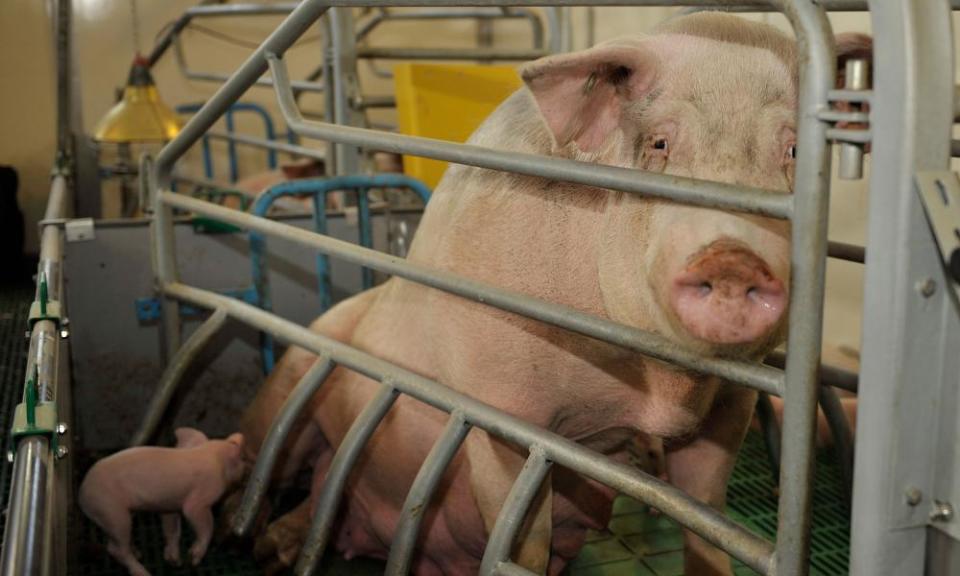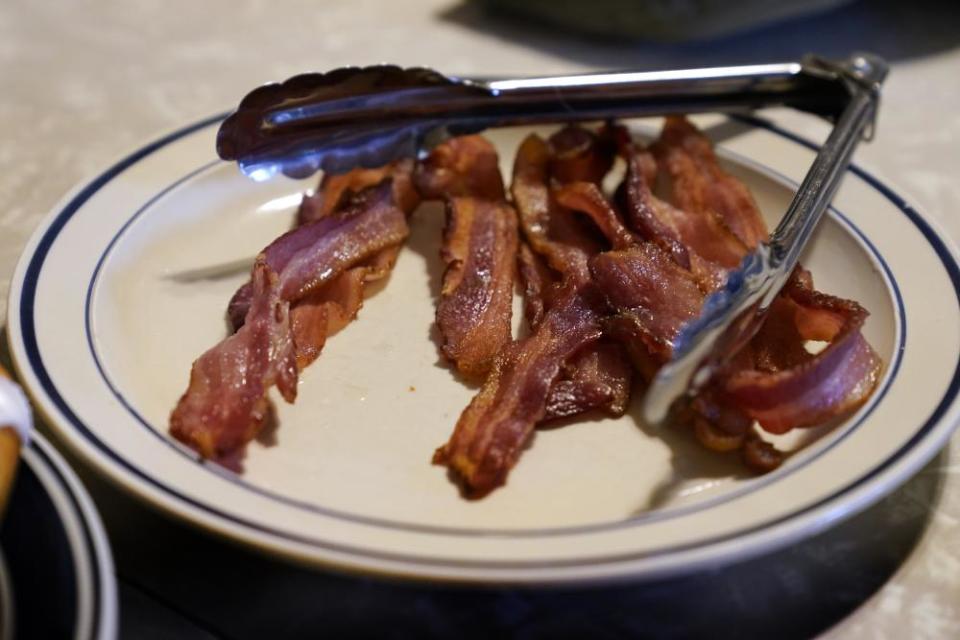Why California’s ‘great bacon crisis’ has yet to arrive

In the months leading up to the arrival of a strict new animal welfare law in California, headlines warned of a “Great California bacon crisis”. The law sets minimum living-space requirements for breeding pigs, which restaurants said could make bacon more expensive and harder to get.
But so far, the pork apocalypse has yet to arrive.
“There seems to be little disruption,” said Ronald Fong, the president of the California Grocers Association, of the law that took effect this month. “We just have not seen a pork shortage.”
California voters approved the law, known as Prop 12, in 2018. It creates minimum space requirements for animals raised to be sold in California, including pigs, calves and chickens. A vital element of the law is that even if a producer is based outside California, they have to follow the rules if they want to sell inside the state.
This is a giant leap forward. It’s the strongest law we’ve seen
Vicky Bond, the Humane League
Breeding pigs must have at least 24 square feet per sow – the size of two large bath towels. While it doesn’t sound like a lot, it’s a big change from the crates many animals live in.
“This is a giant leap forward,” said Vicky Bond, a veterinarian with the non-profit international animal advocacy group the Humane League. “It’s the strongest law we’ve ever seen,” adding that the law puts California ahead of the European Union in terms of animal welfare.
The lack of disruption in California’s pork supply chain so far could be due to the fact that pork produced before 31 December 2021 is considered compliant, and grocers and restaurants can keep inventory for five to six months before it needs to be sold. That means the final supply of 2021 pork is due to arrive in June.
Industry groups, however, have continued to protest against the law, saying it will destabilize the multibillion-dollar US pork supply chain by raising the cost of raising animals. California consumes about 14% of the country’s pork yet only 4% of existing sow housing nationwide meets Prop 12’s standards, according to a 2021 report by the financial services company Rabobank.
Big pork producers have already pulled some products out of the state. And a legal challenge is snaking its way up to the supreme court, filed by the National Pork Producers, though the court rejected a similar challenge last June.
“This will cost the average family farm $15m to $17m,” Michael Formica, the general counsel for the National Pork Producers Council, told a news station in San Diego. “We believe it’s entirely unconstitutional.”

A second legal challenge has been lodged by the grocers, restaurants and the Hispanic chamber of commerce. The suit says that the exact rules haven’t yet been drafted by the California department of food and agriculture, leaving them with little clue as to what actual compliance will mean. “We’re not against Prop 12,” said Fong, one of the plaintiffs in the challenge. “Our issue is: give us clear regulations and ample time to comply and we will.”
The plaintiffs point out that Proposition 2 – another animal welfare law, passed by California voters in 2008, that said animals must be able to turn around freely in their living spaces – was much more narrow in scope in that it applied only to California farmers, and yet it still took more than six years to be implemented. They are asking for 28 months to get into line with the new regulations. Right now, Fong said, the law is in place but he hasn’t heard of any enforcement around pork products sold in California.
Not everyone is concerned, though. A Whole Foods Market spokesperson told the San Francisco Chronicle that the grocery chain doesn’t expect to see any price increases or shortages of pork as a result of Prop 12 this year because Whole Foods already maintains animal welfare requirements.
A University of California Davis study estimated Prop 12 would raise production costs about 15% per market hog, but that the cost passed to the consumer would be less. The researchers predict an 8% increase in the price of uncooked pork, equal to about $0.25 per pound, which would work out to Californians paying $3.55 for a pound of pork compared with an average retail price of $3.30.
Rebecca Boehm, an economist with the Union of Concerned Scientists, said she found it curious that profitable Fortune 500 companies like JVS, Tyson and Smithfield haven’t figured out a way to adapt to the new rules – especially since they are clearly what voters want. “This competitive business spirit, how is that not driving a change?” she said. “People can vote with their dollar or with a ballot, and they voted for this. They should meet that demand.”
Bond said that similar animal welfare laws were in force, including in states like Massachusetts. “As people become aware of factory farming, they absolutely vote to ban these systems. This form of intensive farming can’t continue.”
She noted that the pork industry and the egg industry had acted very differently in the face of the new legislation. According to an analysis by the Humane League, in 2015, just 6% of US hens were raised cage-free. Now, 29% are, as consumers have pressed for higher welfare standards. “The egg industry saw the writing on the wall, that now is the time to invest in the systems of the future,” said Bond. “Whereas the pork industry spent the last three years fighting instead of preparing.”

 Yahoo Movies
Yahoo Movies 